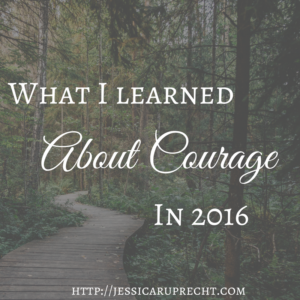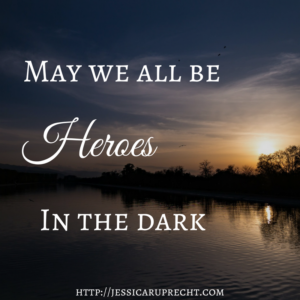 A year ago I decided that my word for the year in 2016 was going to be “DARE” (you can read more about that here). When I chose that word I had a vision in mind for what daring would look like in my year. Specifically, I intended to:
A year ago I decided that my word for the year in 2016 was going to be “DARE” (you can read more about that here). When I chose that word I had a vision in mind for what daring would look like in my year. Specifically, I intended to:
- Live courageously
- Take bold actions
- Let myself be seen
- Trust my body
- Honor my need for rest
- Ask for support when I need it
- Admit when I’m overextended
Looking back now, I think that I actually did a really good job of honoring all of those intentions — the process just didn’t take me any of the places I expected it to…
Instead of building a coaching practice, I significantly scaled back the amount of coaching I was doing. Instead of continuing to blog regularly, I dramatically reduced my blogging frequency. Instead of working on the memoir I’m (oh-so-slowly) writing, I spent the year deeply immersed in self-reflection but didn’t really manage to put words to paper.
I started off 2016 full of energy — when I declared my word for the year was going to be “DARE”, I had bold plans. And then I started to pursue those dreams the way I had always accomplished everything in my life to date: by working and working and working until I was exhausted and miserable.
The initial pursuit of my plans led me to a totally different challenge: how do you do hard things in a way that’s exhilarating and fun without being exhausting and awful?
Because here’s what I really want to tell you: you can set the most amazing goals in the world and you’ll never achieve them if you believe that the only way to achieve them is by working so hard it makes you miserable.
Pushing through even though I was exhausted and miserable is how I’d always accomplished hard things. I’d made myself miserable through five sleepless years and two degrees from MIT. From the outside I seemed very successful… but the reality was I was totally exhausted and burnt out.
In 2016 I learned a lot about daring — but mostly I learned a lot about how it’s impossible to be courageous when you’re already beating yourself up for not being more than you are.
Because ultimately that’s exactly what I was doing.
Every time I pushed myself to do this thing or that thing because I felt I needed to in order to meet my goals I was operating from a place of scarcity. And every time I beat myself up when I didn’t do something I “needed” to I was telling myself that I was inadequate and that my efforts would never amount to anything of worth.
So 2016 was ultimately the year I chose to put my self-directed weapons down.
I declared that I wasn’t willing to do anything if the price was feeling miserable.
I stopped using guilt to torture myself over the things I thought I “should be” doing.
I learned a whole new way of approaching everything I wanted to accomplish.
I started really listening to my body again. I started paying attention to how I was feeling, to what it was that I really wanted.
None of this was easy.
I spent months mired in anxiety as I shed layer upon layer of old habits that were no longer helping me. But when I started doing things again, I knew where to start: I started with what felt good.
I returned to my meditation practice. I returned to yoga with more mindful awareness of my body and less focus on making perfect poses. I returned to my journal and to my writing. I returned to cooking and eating really good food that makes me happy.
I let my desires and my curiosity take me in new directions, too. New languages, new interests, new projects. I’m really excited to be learning Russian and I’ve got something new brewing for this blog… more on that soon!
In some ways I feel like a whole new person, and at the same time I feel more like myself than I’ve ever been.
It was a long and difficult process, but in the end I’m so glad I stuck with the experience and let it change me — because transformation isn’t easy and it takes a lot of courage, but the results have been nothing short of amazing.
As we move into 2017, I’m feeling calmer and clearer than I have in years. My energy is picking up again, albeit slowly. I’m in touch with my body and really listening to myself in a way I haven’t been able to in years. I know what I want to create next.
And, maybe most importantly, I’ve learned that real courage isn’t really about boldness or audacity and it isn’t about killing yourself trying to make impossible things happen.
I believe that most real courage is compassionate and quiet — it’s about inquiring into the truth in your heart unflinchingly, it’s about bearing witness to your hurts and fears as much as to your joys, it’s about being willing to admit that “this isn’t working” and to not make that mean you’re a failure. It means giving yourself permission to tear things down and start over.
Real courage starts silently. It’s the work you do at home behind the closed doors of your own heart.
But what starts as purely internal work begins to change everything about you: they way you get things done, the way you talk to people, the way you show up in the world.
Real courage unfolds softly, quietly, and eventually it takes you by surprise because it seemed like nothing was changing right up until the moment you surprised yourself by speaking up in an uncomfortable situation or daring to try something new.
So if you, like me, grew tired of beating yourself up in 2016… If you, like me, needed to learn how to be brave in a way that didn’t involve white-knuckling your way through fear — then I invite you to turn inwards.
Turn inwards to the truth in your heart and start with the courageous act of admitting what isn’t working; just having the courage to admit where things suck is more than enough for today.
Much love,
Jessica
 I’ve been struggling to find the right words since the election. I don’t want this blog to become a political forum, and yet I feel like the election is something that cannot go unaddressed — we cannot just pick up and go on with business as usual because what happened on November 9th means that business is no longer as usual.
I’ve been struggling to find the right words since the election. I don’t want this blog to become a political forum, and yet I feel like the election is something that cannot go unaddressed — we cannot just pick up and go on with business as usual because what happened on November 9th means that business is no longer as usual.